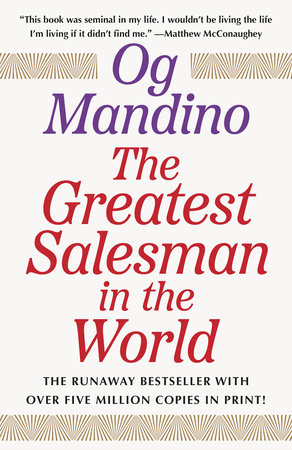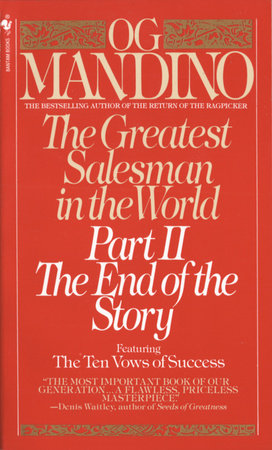Excerpt
The Greatest Salesman in the World, Part II
I
On the outskirts of Damascus, in a stately palace of burnished marble framed by giant palm trees, there lived a very special man whose name was Hafid. Now retired, his vast trade empire had once known no boundaries, extending across so many lands from Parthia to Rome to Britannia that he was acclaimed everywhere as the greatest salesman in the world.
By the time he had removed himself from the world of commerce, following his twenty-sixth year of record growth and profit, the inspiring story of Hafid’s rise from a lowly camel boy to his mighty position of power and wealth had spread throughout the civilized world.
In those times of great turmoil and upheaval, while almost all of the civilized world bowed meekly to Caesar and his armies, Hafid’s fame and reputation had almost elevated him to the status of a living legend. Especially among the poor and downtrodden of Palestine, a border region on the eastern frontier of the empire, Hafid of Damascus was honored in song and poetry as a shining example of how much it was possible to accomplish with one’s life despite obstacles and handicaps.
And yet, for a man who had fashioned such a monumental legacy and accumulated a fortune of several million gold talents, the greatest salesman in the world was far from happy in his retirement.
As he had done on so many other days stretching back through the years, Hafid emerged from the rear entrance of his mansion at dawn one morning, treading carefully on the dew-moistened tiles of polished basalt as he headed resolutely across the huge and shadowy courtyard. Far off, a solitary cock crowed as the sun’s first rays of silver and gold radiated above the desert from the east.
Hafid paused near the octagonal fountain in the center of the wide patio and inhaled deeply, nodding in appreciation at the thick covering of pale yellow jasmine blossoms clinging to the high stone walls that surrounded his estate. He tightened the girdle of leather at his waist, tugged at his soft linen tunic, and continued at a slower pace until he had passed beneath a natural arcade of cypress boughs and was standing before an elevated granite tomb that was free of all ornamentation.
“Good morning, my beloved Lisha,” he half-whispered, reaching forward and softly caressing a white rosebud extending from a single tall bush that guarded the vault’s heavy bronze door. Then he retreated to his nearby bench of carved mahogany and sat staring at the crypt that contained the remains of the loving woman who had shared his life, his struggles, and his triumphs.
Hafid felt the pressure of a hand on his shoulder and heard the familiar and hoarse voice of his longtime bookkeeper and faithful companion, Erasmus, even before he opened his eyes.
“Forgive me, master …”
“Good morning, old friend.”
Erasmus smiled, pointing up at the sun that was now directly above their heads. “Morning has already departed, master. Good afternoon.”
Hafid sighed and shook his head. “Another peril of old age. One never sleeps at night, always arises before dawn, and then slumbers like a kitten through the entire day. There is no logic to that. None.”
Erasmus nodded and folded his arms, expecting to hear another lecture on the sorrows of growing old. But this was not to be like every other morning, for Hafid had suddenly leaped to his feet and raced toward the tomb in long strides until his hand was on the stone. Then he turned and in a strong voice exclaimed, “I have become a sorry excuse for a human being! Tell me, Erasmus, how long has it been, now, since I began this selfish and isolated life devoted only to feeling sorry for myself?”
Erasmus stared wide-eyed and then replied, “The great change in thee commenced with the passing of Lisha and your sudden decision to dispose of all your emporiums and caravans, following her entombment. Fourteen years have run their course since you decided to turn your back on the world.”
Hafid’s eyes had become moist. “Precious ally and brother, how have you managed to tolerate my miserable behavior for so long?”
The old bookkeeper stared down at his hands. “We have been together for almost forty years and my love for you is unconditional. I served you during your greatest moments of success and happiness and I serve you now, just as willingly, even though I have agonized at the living death you seem to have willed for yourself. You cannot return Lisha to life and so you have been trying to join her in that tomb. Remember when you instructed me, many years ago, to secure a red rosebush and plant it next to this white one, after you were dead and laid to rest there?”
“Yes,” replied Hafid, “and let us not forget my constant reminders that this palace and warehouse would be yours upon my death. A small recompense for your countless years of loyalty and friendship and all that you have endured from me since we lost Lisha.”
Hafid reached out, snapped the stem of the solitary white rosebud, and carried it back to the bench where he placed it carefully in his old friend’s lap. “Self-pity is the most terrible of diseases, Erasmus, and I have been afflicted far too long. I have foolishly divorced myself from all humanity, because of my great grief, and made myself a hermit in that mausoleum where you and I reside. Enough! It is time for change!”
“But they have not been wasted years, master. Thy great charitable contributions to the underprivileged of Damascus …”
Hafid interrupted. “Money? What sacrifice was that for me? All people of wealth salve their conscience with gifts of gold for the poor. The rich feed off these contributions as much as the hungry and they make certain that the world is made aware of their great generosity which, to them, is no more than a handful of pennies. No, dear friend, applaud not my charity. Instead, sympathize with my unwillingness to share more of myself.…”
“And yet,” protested Erasmus, “thy seclusion accomplished some good, sire. Have ye not filled thy library with the works of the world’s great minds and devoted countless hours to the study of their ideas and principles?”
Hafid nodded. “I have made every attempt to occupy the long days and nights by giving myself the education I never received as a youth and the effort has opened my eyes to a world of wonder and promise that I had little time to appreciate in my pursuit after gold and success. Still, I have prolonged my grief far too long. This world has provided me with everything a man could desire. It is time I began to repay my debt by doing all I can to help make a better life for all mankind. I am not yet ready for my final resting place and the red rose I instructed that you plant here, upon my death, next to this white one that was Lisha’s favorite, must wait.”






